Updated February 2024.
Hi!
Beautiful in Japanese is 美しい (utsukushii) and beauty is 美しさ (utsukushisa).
But, if you want know some beautiful Japanese words with deep meanings, you’re in luck.
The language is full of Japanese words with deep meaning. Aesthetic Japanese words that don’t have an English counterpart and require explanation.
In this guide, you’ll learn 60+ beautiful words and phrases.
So, let’s jump in.
| Want a bundle of 30+ Japanese PDF Lessons? These colorful and printable PDFs teach you Japanese phrases… and they’re free for new learners. Click here to get Japanese PDF Lessons.  |
1. 木枯らし Cold, Wintry Wind
- Pronunciation:
- Kogarashi
“Kogarashi” is a chilly, cold, wintry wind. It lets you know of the arrival of winter. You know, the kind that sends the shivers down your spine and gives you goosebumps.
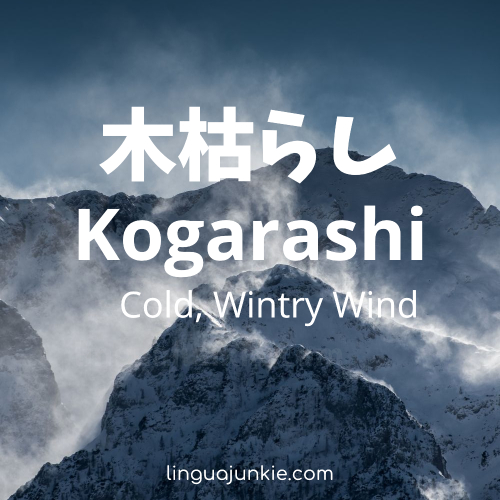
2. 木漏れ日 Sunlight filtering through the trees
- Pronunciation:
- Komorebi
When sunlight filters through the tree leaves and produces rays. You know that 木 stands for tree, 漏れ/もれ means leakage and the 日 kanji stands for the sun. So, tree leakage (of the) sun.
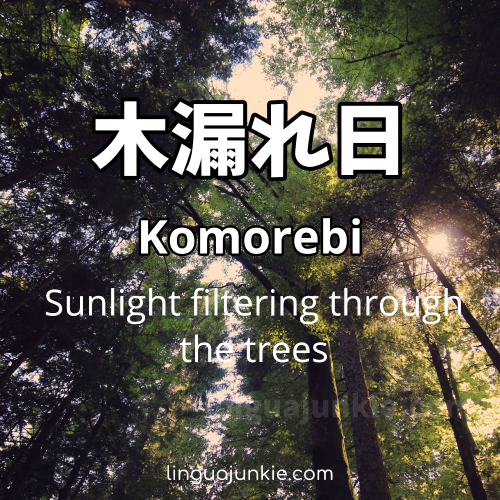
3. 物の哀れ Bitter-sweetness of fading beauty
- Pronunciation:
- Mono no aware
物/Mono means “thing.” And, “aware” looks like the English word, but it doesn’t have the same meaning or pronunciation. It means pity, sorrow or grief. So this refers to the “bittersweetness of fading beauty” – the acknowledged but appreciated, sad transience of things. Kind of like the last day of summer or the cherry blossoms – which don’t last long.
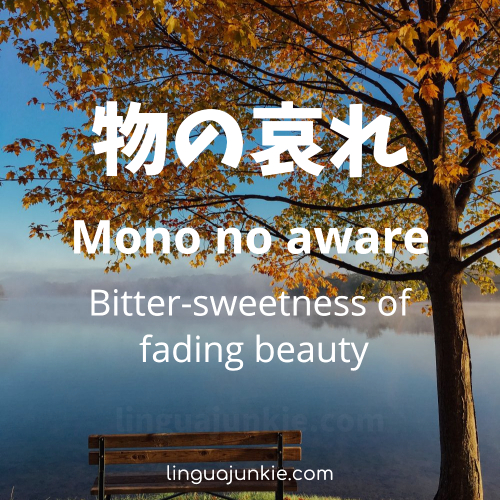
4. 幽玄 An awareness of the universe
- Pronunciation:
- Yuugen
Literally it means “subtle grace” or “mysterious profundity.” This word has different meanings depending on context. But most of the time, it refers to a profound awareness of the nature of the universe – the oneness of all things – to the point where it affects you emotionally.
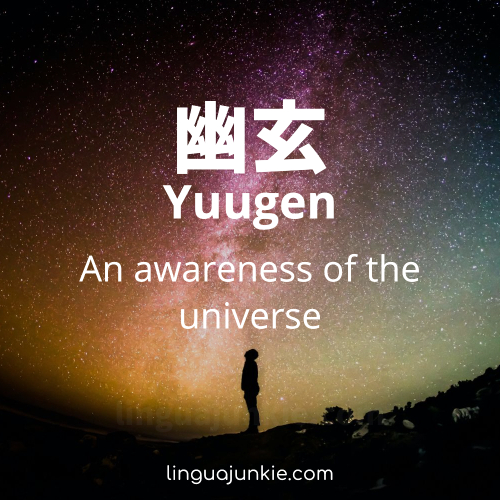
Sound vague and odd? Well, don’t worry. To settle your mind, this word is not translatable and has no English equivalent… so if you’re confused, it’s okay.
5. 和 Harmony
- Pronunciation:
- Wa
This word means peace or harmony. It implies the importance to of avoiding conflict – so as to maintain the (Wa) harmony. And it refers to Japan and the Japanese way itself.
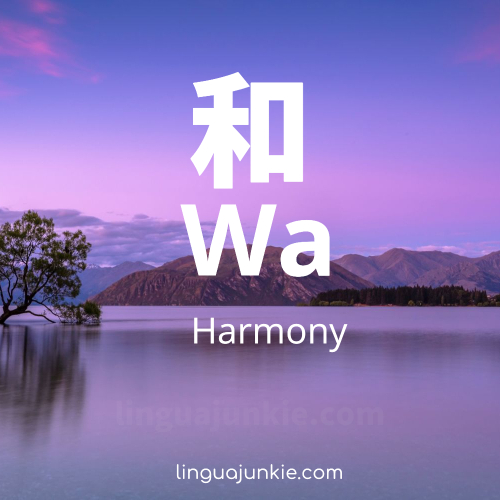
6. 改善 Continuous improvement
- Pronunciation:
- Kaizen
Literally, it means change for better. Whether one time or continuously – this is not implied or intended. It’s not until later that it become continuous improvement by the Japanese business world. Toyota kicked it off.
So, now, it’s just a word (used by businesses) to describe the process of “always improving” and getting better.
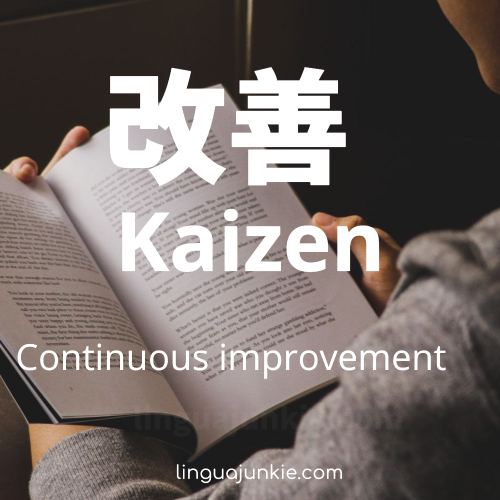
7. 紫 Purple
- Pronunciation:
- Murasaki
Yes, the color purple. Why did it make the list of beautiful Japanese words?
Simply because of how it sounds to the ear. Say it with me – murasaki! Okay, there’s more. Back in the old, old days– say around the year 1400 – this color was the color of the upper class and only high level officials and Imperial family could wear it. So, this color is a pretty big deal and a pretty beautiful Japanese word, in my opinion.
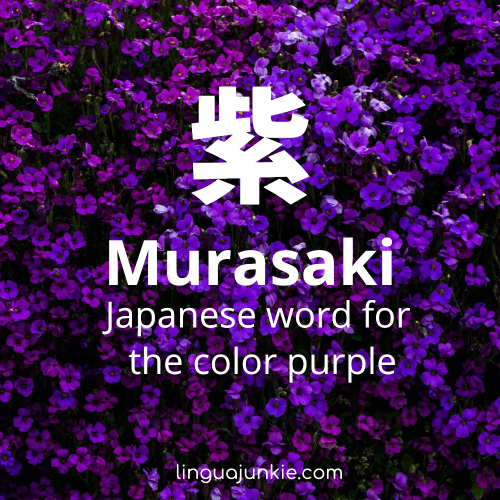
8. 森林浴 Forest Bathing
- Pronunciation:
- shinrin-yoku
So, 森林/shinrin means forest and 浴/yoku stands for bathing. And this refers to being immersed in a forest or talking a walk through the woods. It’s something to do to relax, reduce your stress and improve your health.
And studies confirm that this indeed lowers blood pressure and cortisol.
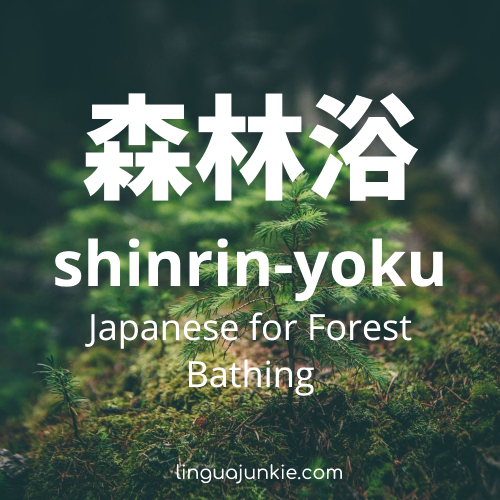
9. 奇妙 Strange, odd, or mysterious
- Pronunciation:
- Kimyou
This is a word that can describe things that are strange or odd. For example, if you suddenly received an anonymous letter, you could use “kimyou.” It can also be used to describe creepy locations like forests, cemeteries, or houses.
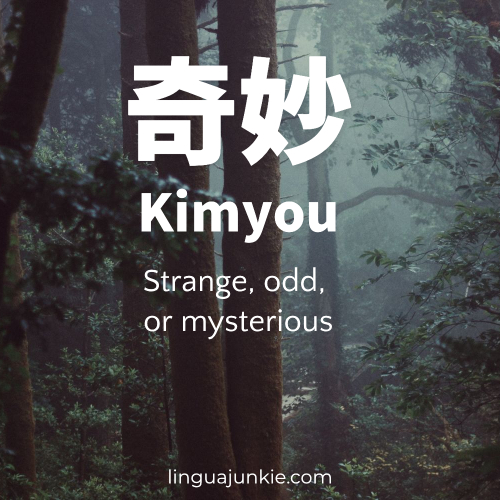
10. 浮世 Floating World
- Pronunciation:
- ukiyo
Now, this isn’t a recent term and you won’t hear it much. It’s rooted in Japan’s history. It literally does mean “浮 – float” and “世 – world/society.” Although it can also be interpreted as “transient world” or “fleeting life.” Basically, this word was used to describe Japanese life-style in Edo-period Japan, where normal people escaped the pressures of the samurai state to entertainment/pleasure districts (whether theater, tea-houses, etc.).
You won’t hear it much in everyday life.
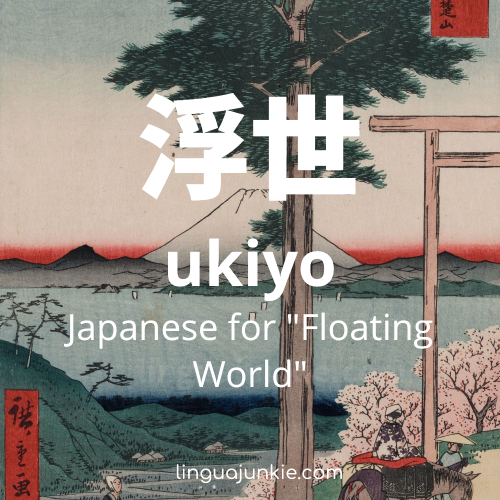
11. 花霞 Flower Mist
- Pronunciation
- Hanagasumi
“Hana” means flower and “gasumi.” What this word refers to is the image of Cherry Blossom trees where the white petals make it look like you’re seeing a mist or haze of white.
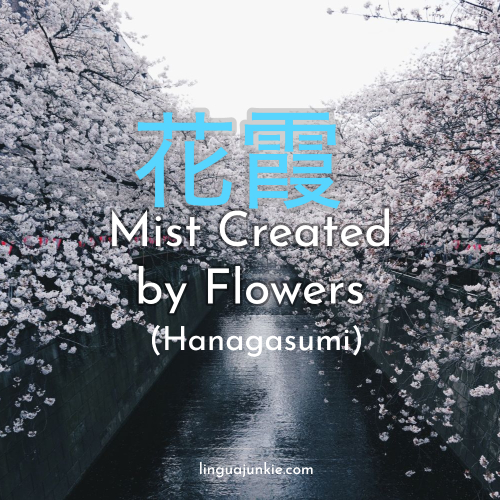
12. 花吹雪 Cherry Blossom Blizzard
- Pronunciation:
- Hanafubuki
花 (Hana) means flower, petal (or cherry blossom) and 吹雪 (fubuki) means blizzard or snowstorm. However, this typically refers to Cherry Blossoms (Sakura) and how their petals come floating down, slowly, en-mass, as if a snow storm or blizzard.
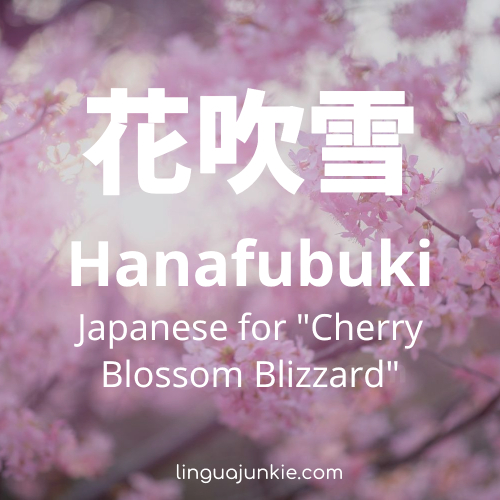
13. 風花 Flurry of Snow in a Clear Sky
- Pronunciation:
- Kazahana
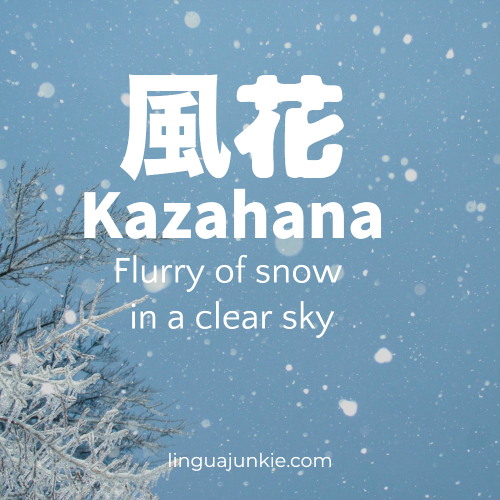
If you go by the kanji, the first one stands for wind and the other one is for flowers. Except, this word is used to describe snow flurries in the wind. Why the flower comparison though? Well, because it’s kind of like petals in the wind.
14. 生き甲斐 Reason for Being
- Pronunciation:
- ikigai
As the Japanese say, everyone has an ikigai. It’s what gets you up in the morning. It’s what moves you. What makes your life worthwhile. Work. Hobbies. Goals. Taking care of kids. Learning Japanese. It’s probably why I’m writing this at 3:17AM on a Saturday morning! Knowing your ikigai might require a lot of introspection and search. Now, let’s break it down:
- 生き – Iki – Meaning: living or being alive
- 甲斐 – kai (though it’s changed to gai) – meaning: worth or use
What’s your “ikigai?” Leave a comment.

15. 一期一会 Treasure every encounter, for it will never recur
- Pronunciation:
- ichi-go ichi-e
This is actually a Japanese proverb; a Zen Buddhist one.
Literally, it means – one time, one meeting. Usually, it’s translated as “one chance in a lifetime.” But the BEST translation is: Treasure every encounter, for it will never recur. So, that meeting you had with a friend or someone… that EXACT moment and everything that happened will never, ever happen again in this life. It was one of a kind and hence it’s worth treasuring.
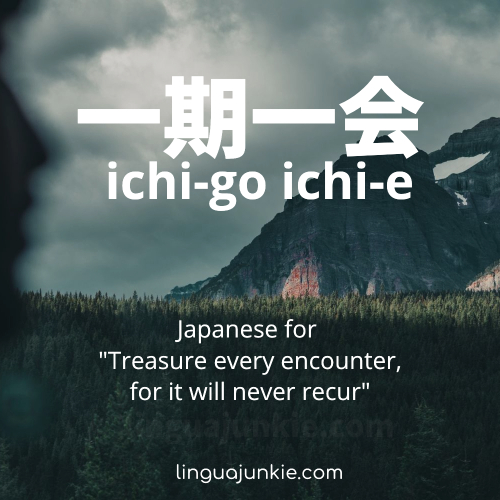
Next on the list of beautiful Japanese words…
16. 恋の予感 Premonition of Love
- Pronunciation:
- Koi no Yokan
This is sort of like love at first sight but not really. There’s more. It’s not a sappy, head-over-heels, heart-pounding, butterflies-in-stomach “love.” It’s a sense you get when first meeting a person – that it’s INEVITABLE that you are going to be in love in the future. Even if you feel no love right now.
- 恋 – koi – love
- 予感 – yokan – premonition
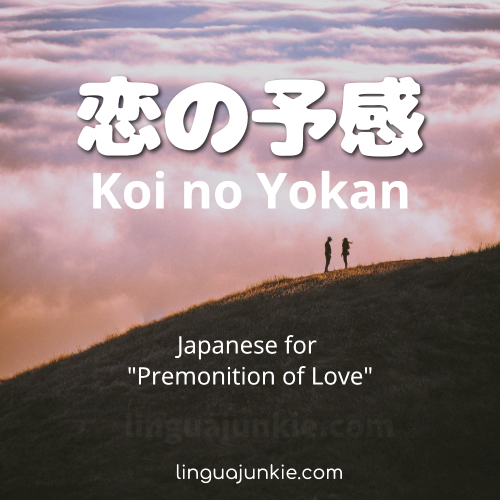
17. 侘寂 Beauty in imperfection; the accepting of life and death
- wabisabi
Wabisabi describes a way of looking at the world. It’s about accepting the transcience and imperfection of things. And thus, for the time we have left, seeing beauty in the things around us. For example, take a rough, cracked, asymmetrical, simple piece of pottery – seeing beauty in that is wabisabi.
This would be a hard concept to accept for people that like new, shiny and perfect things.
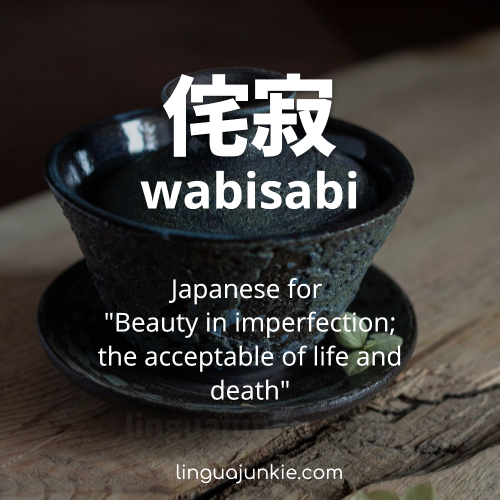
18. 川明かり Glow of a river in darkness
- Pronunciation:
- kawaakari
It can be the reflection of the moonlight on the river. Or, it can be the gleam of light on the river during dusk. Here, 川/kawa means river and 明かり/akari means light.
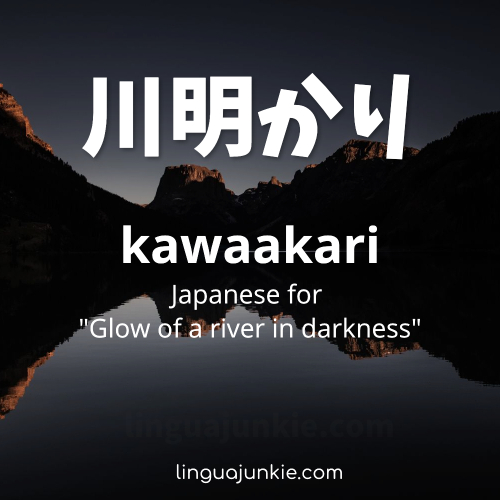
19. 行逢りば 兄弟 Once we meet, we become brother/sister
- Pronunciation:
- Ichariba chode
This is the spirit of hospitality and friendliness to strangers.
And more importantly, you go from strangers to brothers or sisters. That kind of hospitality!
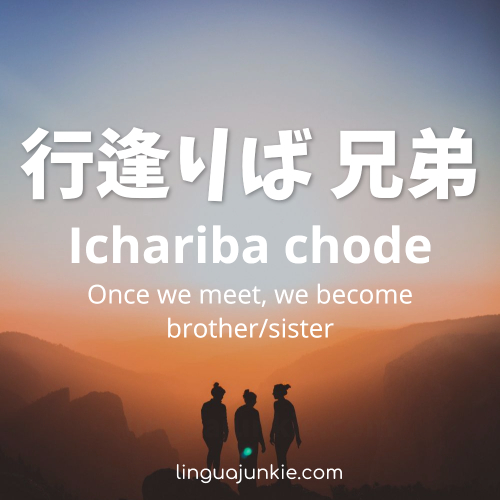
20. 金継ぎ Repair with Gold
- Pronunciation:
- Kintsugi
Also known as kintsukuroi. This is the art of repairing pottery with gold or silver and making something broken beautiful – usually pottery. This is an example of wabisabi where something imperfect is still beautiful!
So with kintsugi, the big point is… you can take something imperfect or broken, and make it EVEN more beautiful than ever.
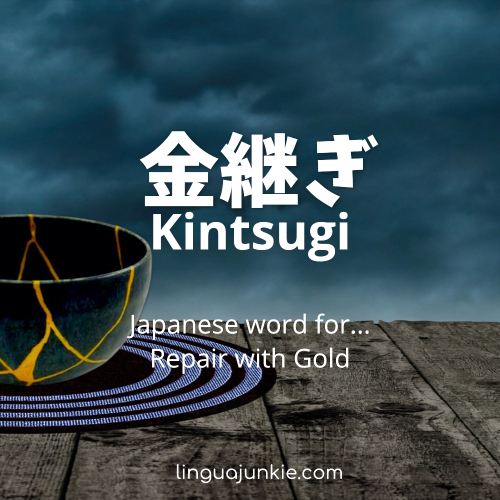
21. 鏡花水月 Flower in the mirror; moon on water
- Pronunciation:
- Kyouka suigetsu
Both, a flower in the mirror and a moon’s reflection on water can’t be touched. So this Japanese phrase refers to something that’s visible but can’t be touched. Something you can feel (for example, beauty or an emotion) but can’t describe in words.
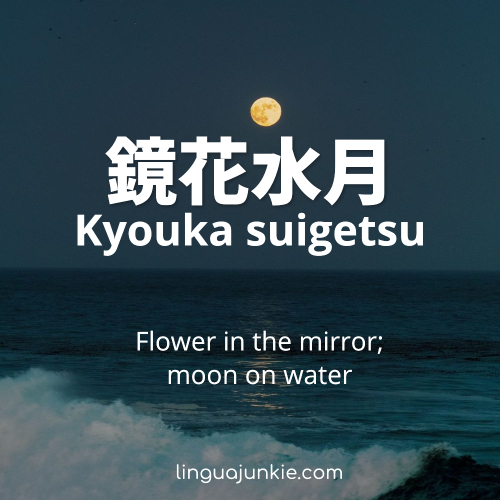
22. 高嶺の花 Flower on a high peak
- Pronunciation:
- Takane no hana
Literally, this means 高嶺/high peak and 花/flower. What it TRULY means is a “goal that’s unattainable.” Something beyond your reach, like a flower!
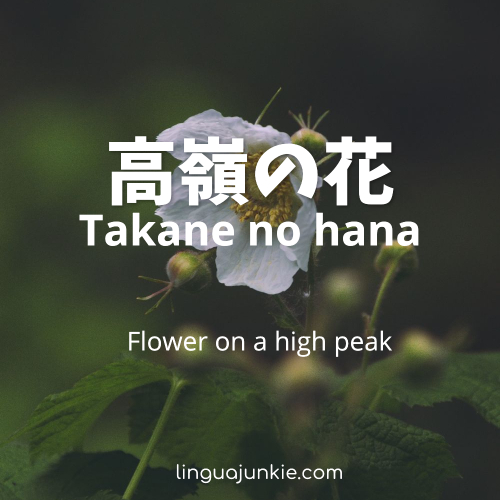
23. 風物詩 Things which remind of a season
- Pronunciation:
- Fuubutsushi
So, anything – feelings, scents, images – that bring memories, thoughts or anticipation of a particular season. Kind of like when you smell that crisp/burning-like scent in the air, long before snow starts falling, and you know winter is coming. The Japanese love their seasons so there are different foods, different fruit (that are grown) products and decorations for different seasons.
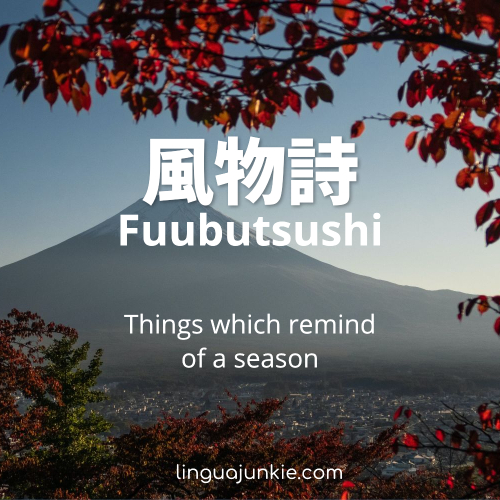
24. 積ん読 Buying/Piling Up Books without Reading
- Pronunciation:
- Tsundoku
You know how you add too many shows and movies to your Netflix queue without watching? Or buy too many vegetables that you never eat? The Japanese have a word for this, except with books. Any book lover knows this. They have books they want to read. They want some other books. And with the overwhelm, they don’t get around to any and let them pile up.
Tsundoku is a combination of the verb 積む (tsumu – to pile up), and 読 (doku – reading.)
This is one of the beautiful Japanese words that I can relate with.

25. 居留守 Pretending You’re Not Home
- Pronunciation:
- irusu
This word is used to describe you when you flake out on the person at your doorstep. They ring the doorbell. *Ding-dong.* And you, suddenly grow very, very quiet, turn off the lights and hope they go away.
This word is a noun and literally means “pretending to be out.”
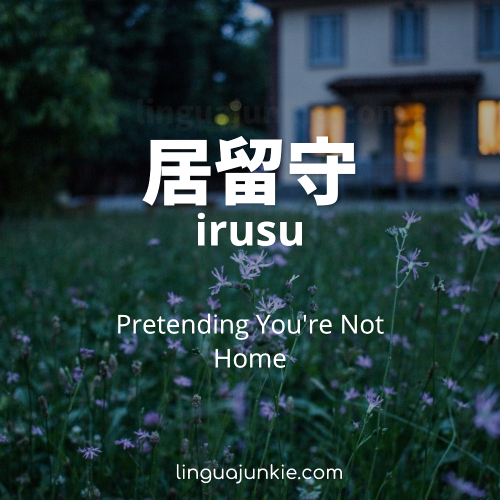
26. 懐かしい Nostalgia/Nostalgic
- Pronunciation:
- Natsukashii
Literally, this word means “nostalgic” and is an adjective. But, this carries a lot more meaning and emotion to the Japanese. People don’t normally blurt out “oh, how nostalgic” in English, because no-one likes nostalgia. It’s seen as negative. For the Japanese, it’s something that brings back memories and warms the heart.
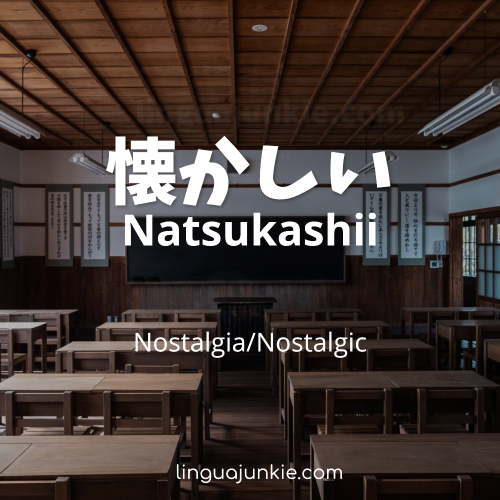
27. 食い倒れ Eating Yourself Into Bankruptcy
- Pronunciation:
- Kuidaore
Let’s break the phrase apart. Kui (食い) means to eat and 倒れ (daore) is a bad debt or collapse. It also comes from the verb 倒れる (daoreru) which means to go bankrupt. How is the word used? It applies to foodies and people that love going out to eat.

28. しょうがない It can’t be helped
- Pronunciation:
- Shoganai
This is a very common and a very Japanese expression. When is it used? People use it as “I can’t do anything about it. I give up.” So, it’s used when things are out of your control (and sometimes when you just don’t want to try hard.)
As much as is this an interesting Japanese phrase, it’s also disliked by others due to the overall “I won’t even try” spirit it carries.
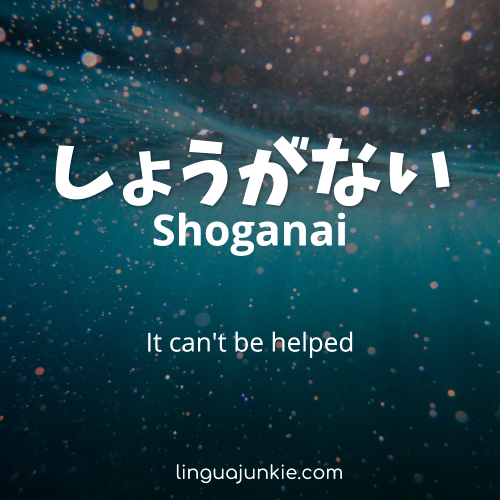
29. 無礼講 Putting everything aside to be yourself
- Pronunciation:
- Bureikou
Interestingly, this word sounds like “break.” And indeed, it is a break. This word represents a situation where you can speak freely, act freely and most importantly, enjoy yourself without worrying about your social status, relation to others, pressure or authority.
This happens at Japanese company drink-outings where the workers and their bosses get drunk and honest with each other.
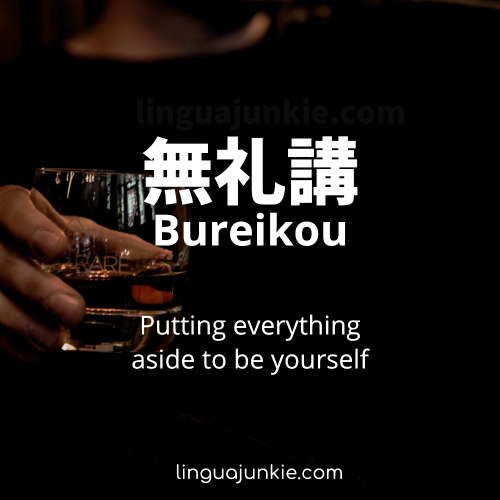
30. ありがた迷惑 An unwelcome favor
- Pronunciation:
- Arigata meiwaku
Politeness and maintaining harmony is important in Japan. So, when someone does something nice. for someone else… Japanese people are compelled to return the favor. Even if they didn’t ask for the nice thing. This phrase captures that mix of needing to repay the favor as well as the annoyance of having to do it.
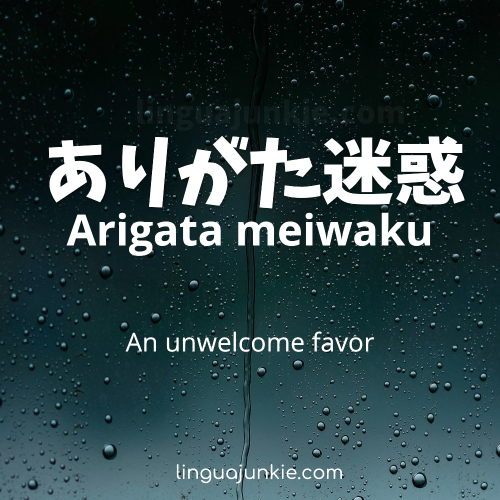
31. 渋い Old School Cool
- Pronunciation:
- Shibui
This is a cool Japanese word to know. And by old school cool, we mean old school cool like Frank Sinatra, Al Capone, old-time cars/cameras and so on. However, this can also have a negative connotation; “stuff only old people like.”
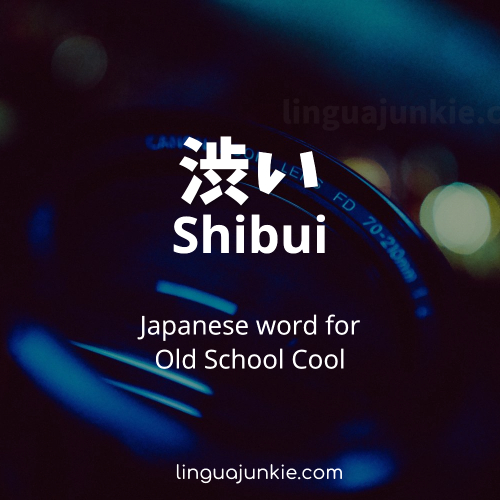
32. 花鳥風月 The beauty of nature
- Pronunciation:
- kachou fuugetsu
This is an interesting one.
Especially if you look at the Kanji in this word:
- flower – 花
- bird – 鳥
- wind – 風
- moon – 月
Flower, birds, wind, moon… all make up elements of nature.
花鳥 (kachou) means “flowers and birds” and 風月 (fuugetsu), meaning cool breeze and bright moon.
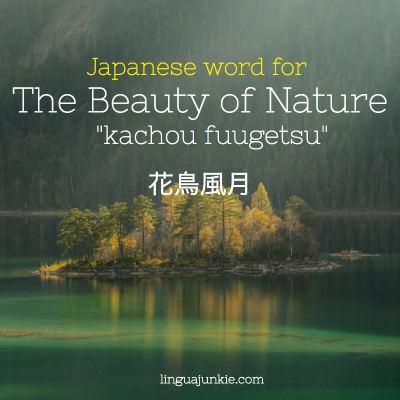
32. 引き籠り Modern Day Hermit
- Pronunciation:
- Hikikomori
This is a word used to describe someone that’s a recluse and stays in. Beautiful Japanese words aside, it’s quite an issue in Japan. This word refers to adults or adolescents who have willingly pulled out of social life, interaction and live in extreme isolation. No friends. No contacts. The Japanese Ministry of Health designates this word for anyone that hasn’t left their home in over 6 months.
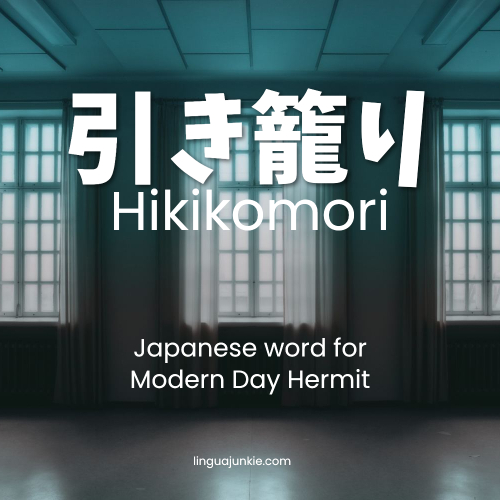
34. わすれもの Forgotten thing
- Pronunciation:
- Wasuremono
Let’s break this word in half. “Wasure” means “forget” and “mono” means thing. So, it literally represents items that are forgotten and list
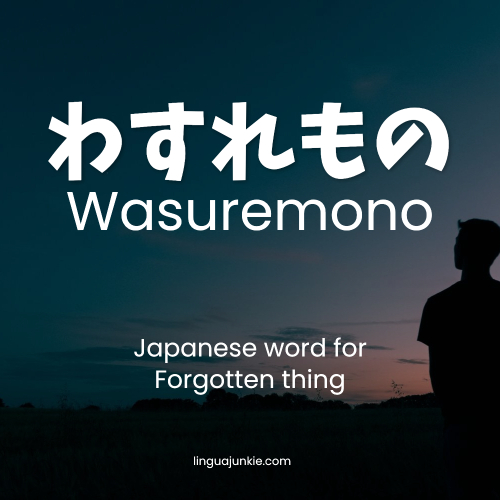
35. 真面目 Hardworking
- Pronunciation:
- Majime
Anywhere else, if you call someone diligent, hardworking and dedicated to a goal, there’s a negative flipside to it. They’re seen as party poopers that won’t have any fun. In Japan, “Majime” carries positive meaning.
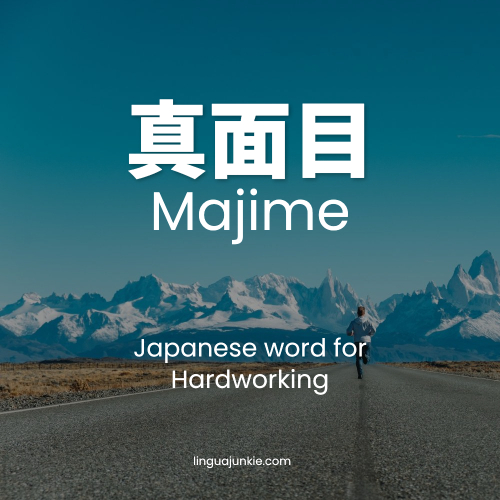
36. よいしょ! Let’s do this!
- Pronunciation:
- Yoisho!
I wouldn’t call this a beautiful word…
This word is more of a “kakegoe” or saying of encouragement to yourself or others. In fact, it’s like an interjection than anything. Kind of like.. “Alright…” “Well…” “Let’s do this” and such… depending on the context.
Kind of sounds like “yoshhh.”
Why’s it on the list? Well, it’s kind of not immediately translatable and needs explanation.
You’ll often hear Japanese people say it to themselves before they start work. You will also hear it when people plop down into a chair or couch after coming home from work. Mostly, it’s said before or just as something is about to be done — before you lift something heavy or as you sit down after a long day. It varies.

37. 香織 Fragrance
- Pronunciation:
- Kaori
Kaori can be a Japanese female name but also refers to fragrance or smell. If something smells good, you can say “ii kaori desu ne.”
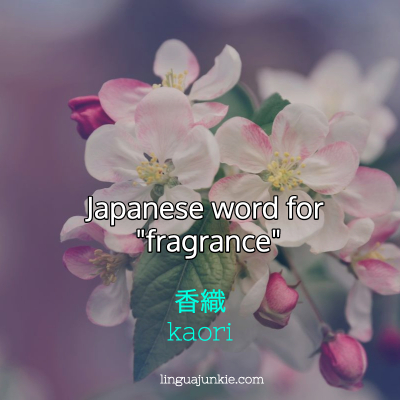
38. おもてなし Japanese Hospitality
- Pronunciation:
- Omotenashi
This word goes above just hospitality. It carries a sense of selflessness obligation to the customer without expecting anything in return. You can see examples of this when store staff bow to you upon entry. Or, when restaurant staff cheerfully yell “welcome.” It’s even as subtle as a toothpick automatically provided inside your pair of chopsticks. Careful thoughtfulness, eh?
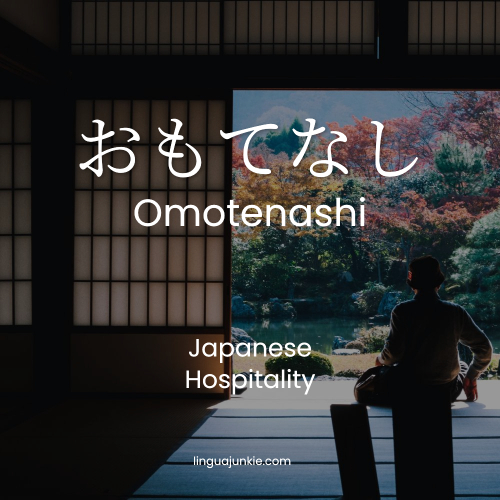
39. 蛇足 Useless as snake legs
- Pronunciation:
- dasoku
So, the word means useless. Where do the snake and legs come from? The first character, 蛇, represents snake and the second one, 足, is legs. When you want to say something is useless or redundant, use this.
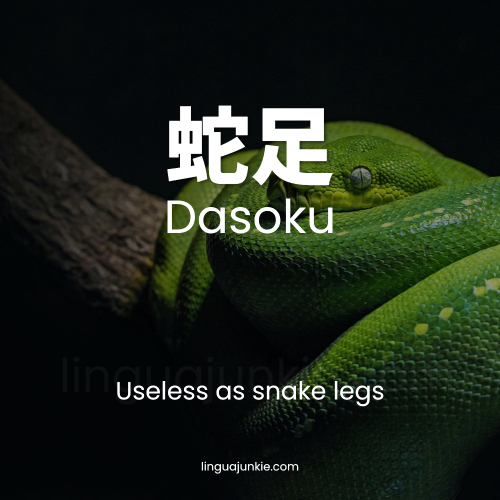
40. 口寂しい Longing to have something in your mouth
- Pronunciation:
- kuchisabishii
Literally, this means “mouth lonely.” And this is in regards to food. So, this is when you eat when you’re not hungry but because you have nothing better to do.
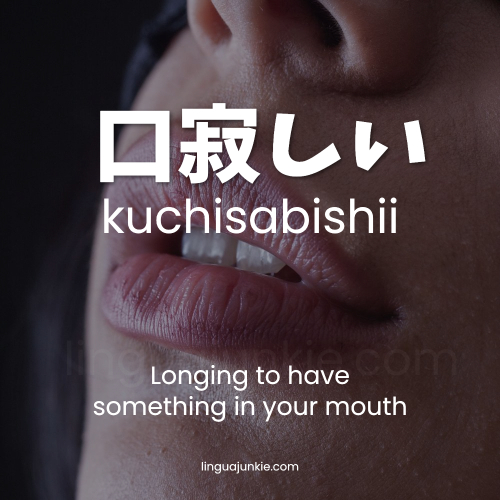
41. 辻斬り Killing a passerby to test a new sword
- Pronunciation:
- Tsujikiri
If you’re thinking that this has to be a samurai sword word, you’re right. When one buys a new car, they take it for a drive. Bed? They take it for a nap. And a sword? Well, you do what swords are designed to do. If you were a samurai back in the day, where else would you find another person? While passing them by on the street!
So, tsuji means street or crossroad and the second part, kiri, is to slice or kill.
Definitely one of the more “fun” beautiful Japanese words here.
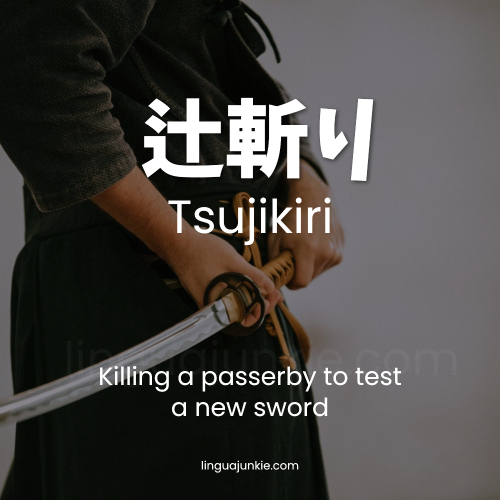
42. 紅葉 Leaves changing color
- Pronunciation:
- kouyou
The first character means “crimson” or “red” and the second one means “leaves.” But, in general, this term is known as the changing of colors of leaves in Autumn. In Japan, this is a pretty big deal as well, akin to admiring the cherry blossoms in the Spring.
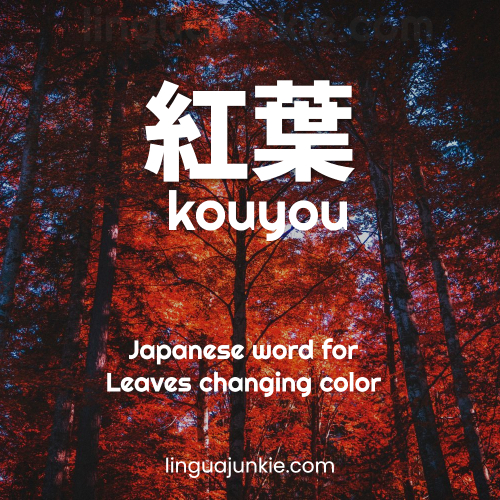
43. いただきます I humbly receive (food)
- Pronunciation:
- Itadakimasu
I mean, who doesn’t want to receive food? The Japanese say “itadakimasu” before they eat. This is what’s known as a Japanese set phrase — a phrase used with certain occasions… like eating! But, as with all beautiful Japanese words, this one has more nuance to it. It also includes thanks and gratefulness to everyone who was responsible in making the food. Farmers growing the veggies. Those that have delivered it to the city. And your cook as well.
This word also goes back to the Buddhist concept of being respectful to all things.
You’ll normally see this translated as “bon appetit” but translations won’t get the meaning and feeling right.
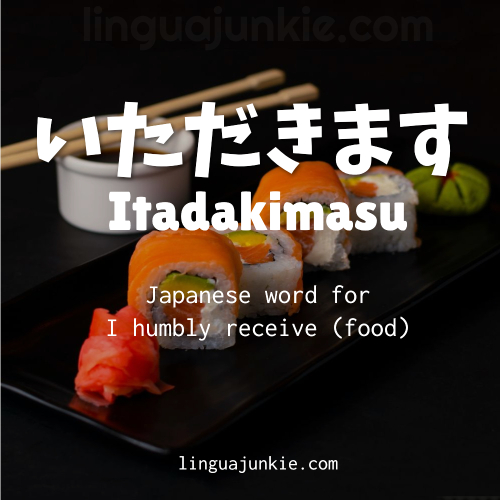
Here’s another one of my favorite beautiful Japanese words.
44. おじゃまします I will disturb you in your home
- Pronunciation:
- Ojamashimasu
Jama means disturbance. Shimasu means to do. It just means “I will bother you.” However, you use this when you enter someone’s home. It’s a sign of respect for the person you are visiting and their home.
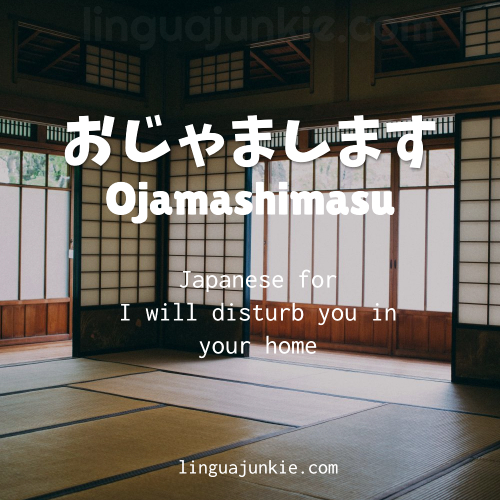
45. お疲れ様です “it’s been tough and you must be tired”
- Pronunciation:
- Otsukaresama desu
This is another Japanese set phrase.
Like the 2 words above, this one also is a native Japanese saying and cannot be translated with one or two words alone. Otsukare is often used at the end of the day to others, like coworkers, team players or students where both of you literally worked hard.
It’s a parting greeting but is also used to acknowledge that “you have worked hard.”
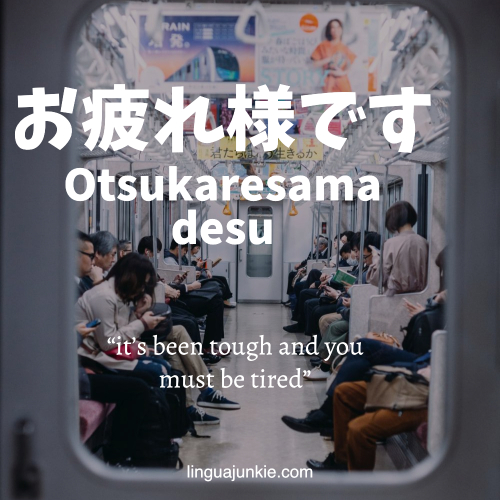
46. もったいない “What a waste…”
- Pronunciation:
- Mottainai
While this first and foremost is used to express regret over waste – like food, there are other uses too. You can use it to say that there’s too much of something, and thus it’s a waste. Or, you can use it to say you are “mottainai” in the event that someone is too good for you.
Actually, this is a common way to say “it’s not you, ‘it’s me” as a way to reject someone in Japanese.
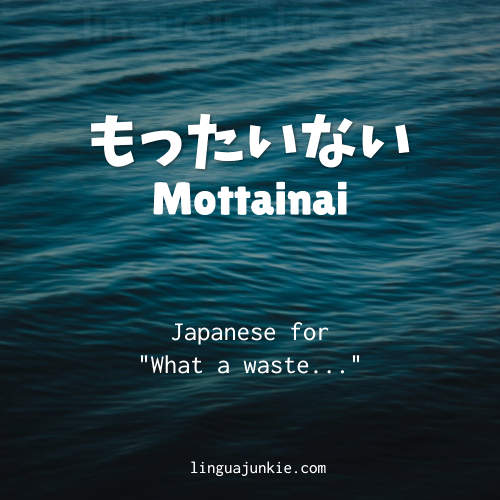
47. 猫舌 Having a cat’s tongue & a dislike for hot food & drink
- Pronunciation:
- nekojita
The real meaning of this word is just a “dislike for super hot foods and drinks.” But, for some reason, it’s made of 2 characters. The first one means cat. The second is tongue. While we have no proof that cats hate hot/warm food, that’s the way the phrase goes. So, if you can’t handle that, you’re said to have a cat’s tongue.
By the way, hot meaning in temperature and not spiciness.
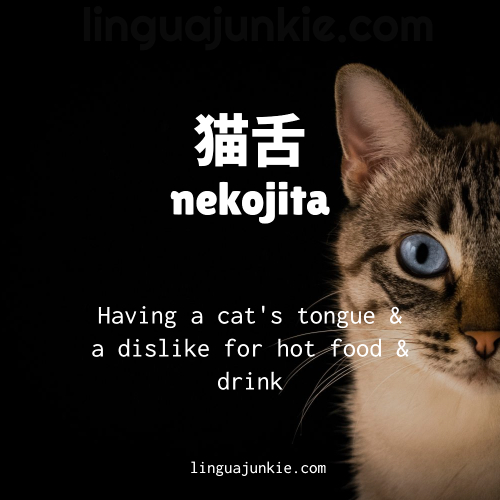
48. 落葉 Fallen Leaves
- Pronunciation:
- Rakuyou
This is another fall-themed word. Why is it on my list of beautiful Japanese words? Well, in English, it takes 2 words to express it. In Japanese, it’s just one. And because it’s one, it carries a stronger image of autumn, fallen leaves and the atmosphere.
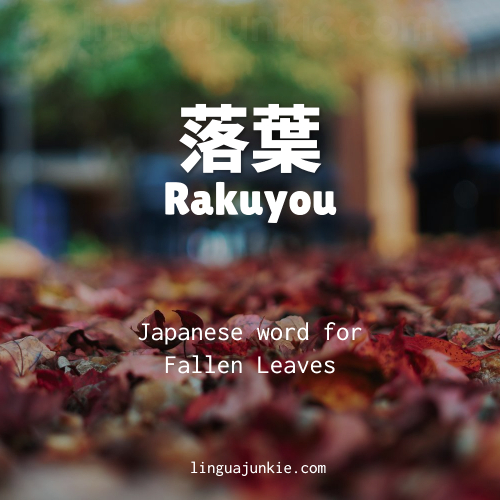
49. 飛花落葉 Scattering of Blossoms
- Pronunciation
- Hikara rakuyou
You know “rakuyou…”
Well, this version refers to the scattering of cherry blossoms. It is also a “yojijukugo,” a Japanese saying made up of 4 Kanji.
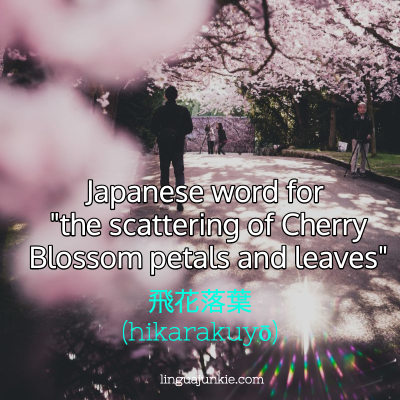
51. 月見 Cherry Blossom Viewing
- Pronunciation:
- Hanami
Hanami is literally translated as “flower viewing.” But, it is mostly used for going to see the Cherry Blossoms (also known as Sakura). This is a Japanese tradition where many Japanese head out to see the Sakura in their full bloom.
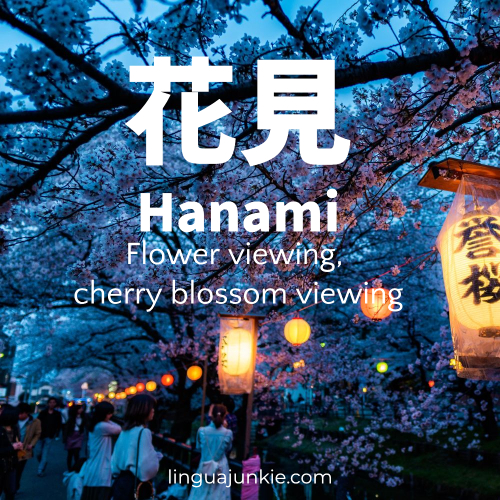
52. 月見 Viewing the moon
- Pronunciation:
- Tsukimi
Just like there’s a “cherry blossom viewing,” there’s also a moon viewing. When does this happen? Usually in September or October when there’s a full moon.
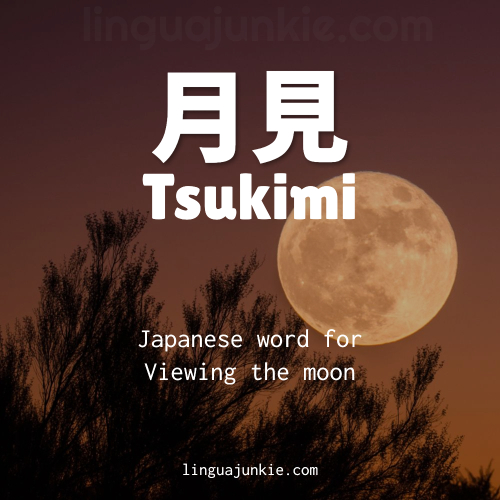
53. 雪見 Snow viewing
- Pronunciation:
- Yukimi
You heard of cherry blossom viewing. You heard of moon viewing.
Well, then there is “Yukimi” which means snow viewing… and watching the snow come down. For the Japanese, this is preferably done while in a warm onsen bath/hot spring resort with a view.
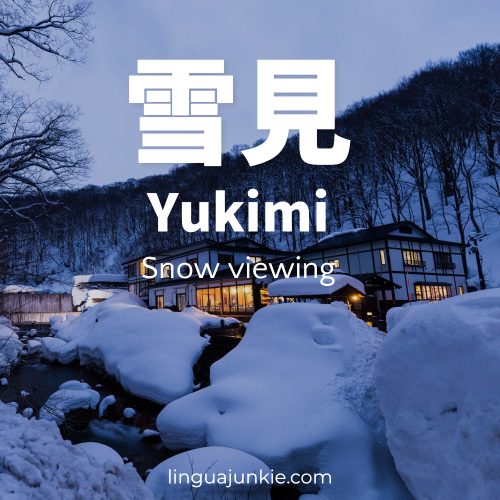
54. 紅葉 Japanese crimson maple leaves
- Pronunciation:
- Momiji
Pick apart the characters and this just means “crimson” and “leaves.” However, say this word out loud. Momiji. It’s nice sounding word and hence made it on the list!
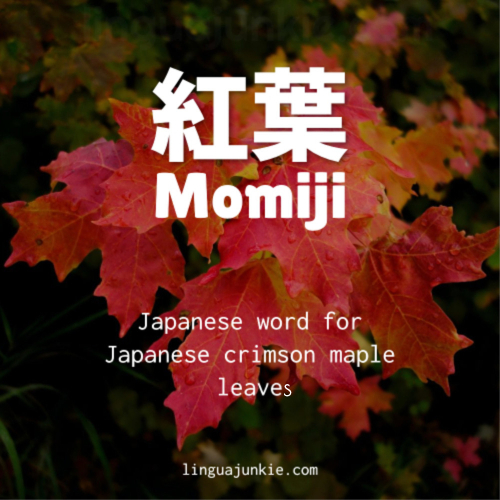
53. 猫かぶり Wolf in sheep’s clothing
- Pronunciation:
- Nekokaburi
This means “feigned innocence or naïveté.” In other words, the person is pretending to be dumb and innocent, like a wolf in sheep’s clothing. However, the Japanese word here is totally different. If you pick apart the words, it means “to put on a cat.” Why cat? Well, know how cats decide to whack items off tables and look at you like they’ve done nothing wrong?
That’s where it comes from.
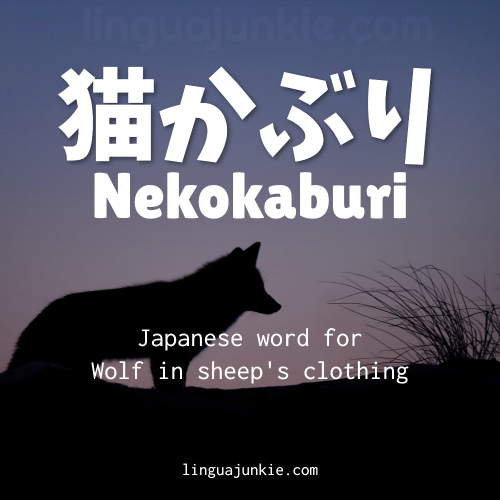
54. ボケット Gazing vacantly into the distance, without thinking.
- Pronunciation:
- boketto
This word comes from ぼけとする/boketosuru – to daydream. Boke, interestingly enough, also means fool. But, don’t let that tarnish this word. It’s nice not to think sometimes. Some things are not worth thinking too much about!
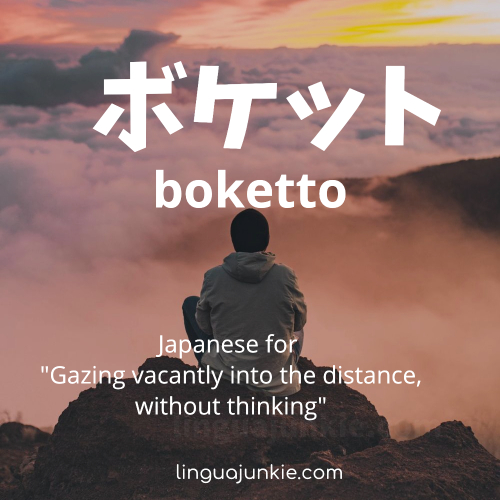
55. 浪人 A Wandering Samurai Without a Master
- Pronunciation:
- rounin/Rōnin
The first part, rō (浪) means “wave” or also “unrestrained”, while nin (人) means person.
Back in the day, according to their warrior code, samurai served a master and it was dishonorable to go on without one. They would have to commit suicide (seppuku). So, wandering around without a master went against the code and was considered dishonorable.
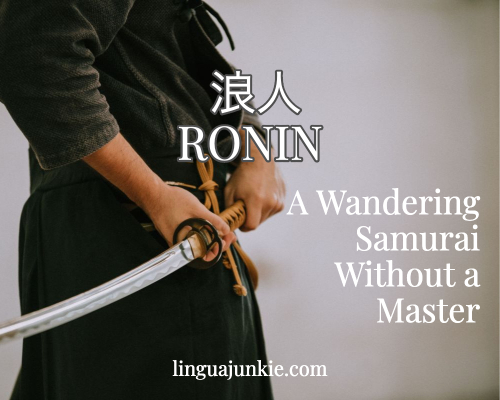
Of course, you can debate whether this is a beautiful word or not, but it certainly carries a lot of meaning that requires explanation, and is not easily translatable.
56. Salty Sea Breeze
- 潮風
- Pronunciation: Shiokaze
If you’ve ever smelled the salty ocean water in the air, then this is the word for you: 潮風 (shiokaze).
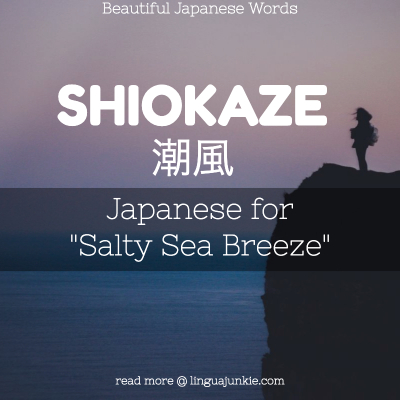
57. Evening Glow
- 夕焼け
- Pronunciation: Yuuyake
Ever notice that orange tint that kicks in as the sun sets in the evening? Whether on buildings, trees, or just the overall look of your surroundings? Well, that’s the good old evening glow that makes everything look and feel warm and serene. And the Japanese word for it is “yuuyake.”
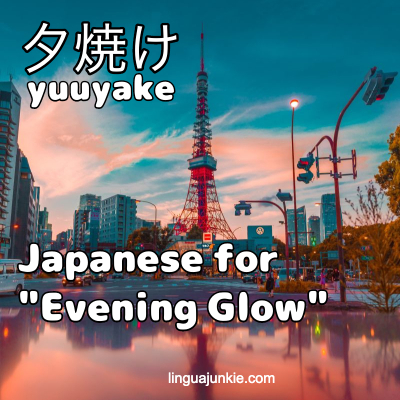
58. 永遠 – Eternity
- Pronunciation: Ei-en (or, “Ey, en”)
This one in particular is 1) pleasant to the ear and 2) just a cool word in general — eternity. Say it with me, “ei-en.”
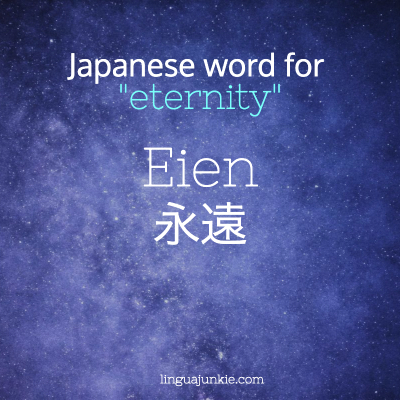
59. 花火 – Fireworks
- Pronunciation: hanabi
What makes this a beautiful word is the combination of Kanji: 花 flower and 火 fire. And if you look at fireworks… well, they do look like flowers. Wonderful imagery.
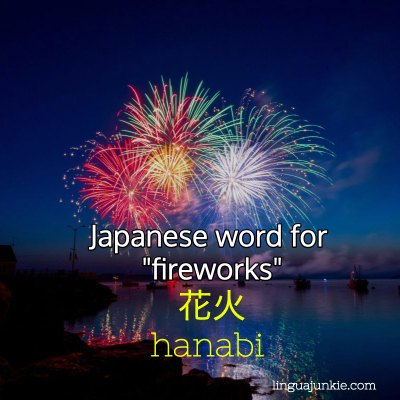
60. 自動販売機 Vending Machine
Alright, how did a vending machine make this list of beautiful Japanese words? Well, mind you I am biased. But bear with me and see how this word is said:
- Pronunciation: jidou hanbai ki
Honestly, I struggled with the pronunciation when I first learned it, but it’s a wonderful mix of sounds… and also a great place to buy drinks. And to be honest, vending machines do have a unique vibe and look with their blue glow at night. I’d say, there is some beauty in there.
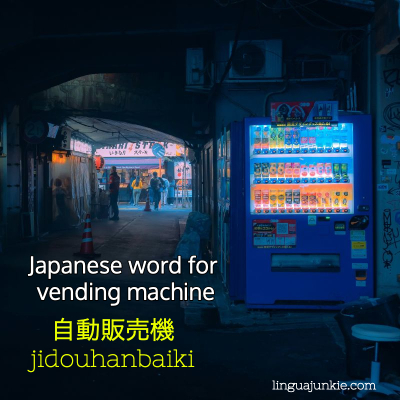
61. Oubaitori
So, this one requires some explanation…
- 桜梅桃李
- Oubaitori (oh-bye-toh-ree)
Oubaitori is comprised of 4 Kanji, each standing for certain kinds of flowers – the cherry blossom/sakura, the ume, the peach, and the plum blossom. These 4 kinds of blossoms grow around the same time, in close proximity, but they are vastly different from each other.
And so, the oubaitori concept can be understood as “everyone is different.” Just like these flowers grow in their own ways, humans have their own paths.
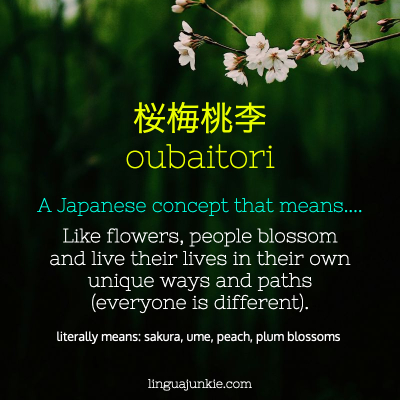
Oh, You’re Here!
Now you know some beautiful Japanese words with deep meanings.
Yes, you’re right – there are TONS more and I update this list as I come across new words.
But this is a quick, easy lesson for Beginners that want to start slowly.
So… here’s my question to you:
Do you have any favorite beautiful Japanese words? Any phrases that I missed or that you want me to add to the list?
Let me know in the comments and I’ll add them.
Want to learn even more words and learn Japanese? Check out my other posts:
- Japanese MP3 Lessons & Audio
- Japanese PDF Lessons
- How To Introduce Yourself in Japanese
- Or, stop reading articles and check my recommended Japanese learning program below.
– written by the Main Junkie

Given how much I love the smell of the ocean, 潮風
has to be my favorite word here.
[…] looking at things. And as such, when you’ll learn another language, you’ll come across beautiful Japanese words and phrases that are… unique. Untranslatable. Where the literal meaning doesn’t match […]
Hi I really liked wabi Sabi, I was wondering if there was any Japanese quote encompassing it? Or a translation perfectly imperfect, was wanting to get something of this nature as a tattoo. Thanks!
What is the word for something coming in and out of view from clouds?